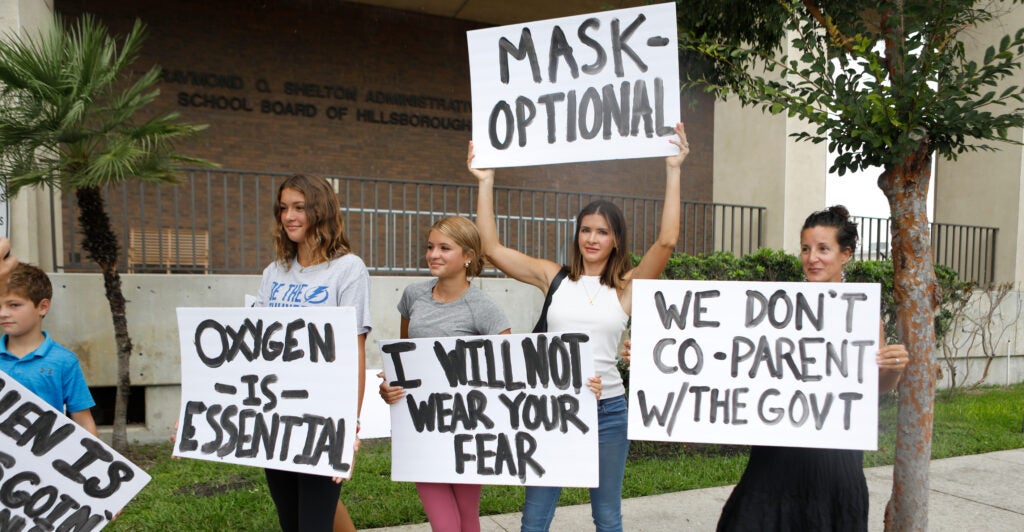Even though policy should be based on accurate data, the Centers for Disease Control and Prevention is failing to accurately justify its guidance that vaccinated people wear masks.
The data clearly show that the vaccine helps people more than previous interventions, including mask mandates, and that the risk of dying from COVID-19 for the vaccinated is extremely low.
The CDC should follow the science, be transparent, and base all guidance on the data.
Originating in India, the delta variant is now the primary strain of COVID-19 here in the United States. A number of states, including Alabama, Louisiana, Florida, and Texas, have been experiencing surges in new cases and hospitalizations.
Given such concerns, the CDC investigated the delta variant’s spread last month. In a Morbidity and Mortality Weekly Report released on July 30, a number of researchers examined COVID-19 spread last month during a variety of festivities in Barnstable County, Massachusetts.
The authors made a number of claims, including that 74% of those who tested positive for COVID-19 after the festivities were fully vaccinated.
Not surprisingly, this statistic made the news headlines. For example, the day the study was released, an article on CNBC.com reported: “CDC study shows 74% of people infected in Massachusetts Covid outbreak were fully vaccinated.”
Given how much attention the analysis had gotten, my colleague Norbert Michel and I decided to take a look at the study in critical detail. After all, public policy should be informed by credible and accurate analysis.
We found that the study failed to look at the question at hand with sufficient rigor and does not provide support for the study’s main recommendation about mask wearing among the vaccinated.
Among the 469 who tested positive, 74% indeed had been vaccinated. However, as we discussed in our report, the data that this estimate is based on are not representative of the Barnstable attendees, let alone of the entire country. Therefore, it would be a mistake to use those estimates to make inferences of the broader American population.
Second, there’s a more fundamental question the authors neglected to look at: Infection rates in the broader context of the number of people who actually attended the festivities, both vaccinated and unvaccinated.
We also examined this question, making a variety of assumptions on available data and information. Assuming an attendance of 60,000, as has been suggested by a number of people, and a vaccination rate of 90% of attendees, we found the following infection rates.
Of course, as it’s difficult to know the actual vaccination rate, we reestimated the above percentages under a variety of other assumptions as well.
At the time of publication, the state of Massachusetts and Barnstable County had adult vaccination rates above 74%, and Provincetown itself had a rate of 90%.
As the festivities may have included some out-of-state visitors as well, we decided to estimate the percentage of infections under vaccination rates between 60% and 98%.
So, there you have it, under all such assumptions, less than 2% of the vaccinated attendees caught COVID-19. Irresponsible reporting suggesting that 74% of those vaccinated caught the virus, however, needlessly causes panic and will only increase vaccine hesitancy.
Although some research has indicated that the vaccines may have slightly less efficacy in preventing infection against the delta variant than prior variants, the vaccines are nevertheless highly effective at preventing hospitalization and death.
Furthermore, as a result of the CDC’s “study” on Barnstable, Massachusetts, one of the policy recommendations is that the fully vaccinated continue to wear masks in areas of high disease proliferation.
However, as Michel and I have illustrated in prior work, mask mandates do not meaningfully impact case proliferation. In an earlier Heritage Foundation special report, we statistically examined the impact of an executive order signed by Kansas’ Democratic governor, Laura Kelly, allowing each of the state’s 105 counties to take part in an optional mask mandate last year.
Our analysis did find slightly less case growth at times in the cases in which masks were mandated. However, on a monthly basis, those differences were not statistically significant and, most alarmingly, per capita cases and deaths continued to grow in both groups through most of the second half of last year.
Vaccines, on the other hand, have been largely successful, as is evident by the steep drops in case counts, followed by increases in vaccination rates over the years. Bottom line: Unlike masks, the statistics on vaccine efficacy are solid and well-established.
Of course, there will continue to be breakthrough cases, but the CDC’s own data indicate that the truth is the vaccines have had over 90% efficacy against hospitalization and death.
Not surprisingly, however, among the unvaccinated, COVID-19 can still be quite deadly, especially for the elderly and those with chronic conditions. The following chart puts those odds in perspective with other causes of death.
As the chart illustrates, however, the odds of dying of COVID-19 despite being fully vaccinated, although not zero, are slim to none. In fact, those under 65 have significantly higher odds of getting struck by lightning.
Bottom line: Mask mandates on the vaccinated will only increase vaccine hesitancy and thus only prevent our country from putting this pandemic behind us.
One of the best ways to encourage the vaccine hesitant to reconsider is not mandates of any nature, but rather to equip them with good statistical analysis so they can work with their doctors to make informed decisions.
Have an opinion about this article? To sound off, please email letters@DailySignal.com and we’ll consider publishing your edited remarks in our regular “We Hear You” feature. Remember to include the url or headline of the article plus your name and town and/or state.
